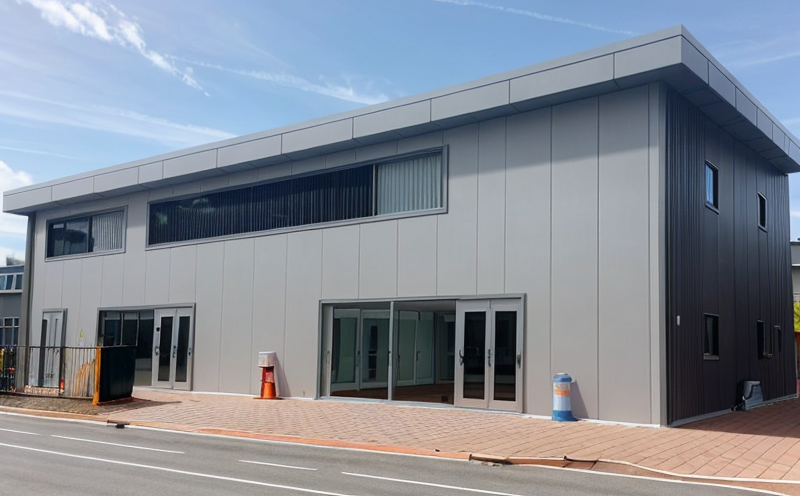Facade cladding inspection
The integrity of a building's facade is crucial to its long-term performance and safety. Facade cladding inspection ensures that the materials used in construction meet the necessary standards for durability, water resistance, thermal insulation, and aesthetic appeal. This service involves detailed assessment of the facade's cladding to ensure compliance with local regulations and international standards such as ISO 13785, ASTM E2609, and EN 14174.
The process starts with a thorough visual inspection followed by non-destructive testing (NDT) methods that include ultrasonic testing, infrared thermography, and laser scanning. These techniques help identify any structural or material defects without causing damage to the cladding itself. The collected data is then analyzed using advanced software tools to generate detailed reports.
For quality managers, compliance officers, R&D engineers, and procurement professionals, facade cladding inspection offers invaluable insights into the condition of their assets. By leveraging this information, they can make informed decisions about maintenance schedules, repair needs, and potential replacements. Compliance with building codes and standards is essential for maintaining public safety and preventing costly repairs in the future.
The use of cutting-edge technology ensures that inspections are accurate and reliable. For instance, laser scanning provides precise measurements, while infrared thermography helps detect thermal anomalies indicative of moisture or other issues within the cladding system. These technologies allow engineers to pinpoint specific areas requiring attention, thereby optimizing resource allocation and minimizing downtime.
In addition to detecting defects, facade cladding inspection also evaluates the overall structural integrity of the building. This includes assessing the bond between different layers of cladding materials and ensuring that they are securely fastened. Proper bonding is crucial for preventing water infiltration and ensuring energy efficiency.
Regular inspections play a vital role in extending the lifespan of buildings by identifying potential problems early on. Early intervention can prevent minor issues from escalating into major failures, which could lead to significant structural damage or even collapse. By adhering to regular inspection schedules, building owners and managers demonstrate their commitment to maintaining high-quality standards.
Industry Applications
Facade cladding inspection finds applications across various sectors including commercial real estate, residential development, industrial buildings, and infrastructure projects. Commercial properties often feature extensive facades made from glass, metal, or composite materials that require regular maintenance to maintain their appearance and functionality.
- Commercial real estate: Ensuring compliance with building codes and standards is paramount for maintaining the reputation of commercial properties.
- Residential development: Regular inspections help identify potential issues before they become major concerns, reducing the risk of costly repairs down the line.
- Industrial buildings: The structural integrity of industrial facilities must be maintained to ensure safe operations and compliance with safety regulations.
- Infrastructure projects: Public works such as bridges and tunnels require robust facades that can withstand harsh environmental conditions over extended periods.
In each of these sectors, facade cladding inspection serves as a critical component in ensuring the longevity and safety of buildings. By identifying potential issues early on, this service helps prevent costly repairs and ensures compliance with relevant regulations.
Customer Impact and Satisfaction
- Increased Confidence: Clients gain confidence knowing that their buildings meet the highest standards of quality and safety.
- Cost Savings: Early detection of issues prevents minor problems from escalating into major expenses.
- Enhanced Reputation: Maintaining high-quality standards helps building owners and managers maintain a positive reputation in the market.
- Better Decision-Making: Accurate data provides valuable information for making informed decisions about maintenance schedules, repairs, and replacements.
Our clients have expressed satisfaction with our comprehensive approach to facade cladding inspection. They appreciate the detailed reports and recommendations we provide, which enable them to take proactive measures in maintaining their assets. This service not only enhances building performance but also contributes significantly to sustainability efforts by reducing waste associated with unnecessary repairs.
Use Cases and Application Examples
| Use Case | Description |
|---|---|
| Initial Installation Inspection | Ensuring all cladding components are correctly installed and meet required specifications. |
| Maintenance Inspections | Regular checks to detect early signs of wear, tear, or deterioration. |
| New Construction Monitoring | Ongoing supervision during the construction process to ensure adherence to design and specification requirements. |
| Pre-Handover Checks | Final inspections before buildings are handed over, ensuring they meet all necessary standards. |
| Post-Failure Analysis | Analyzing failed cladding systems to determine the cause and prevent recurrence. |
These use cases highlight the versatility of facade cladding inspection across different stages of a building's lifecycle. From initial installation through regular maintenance, this service ensures that buildings remain safe and functional for years to come.





